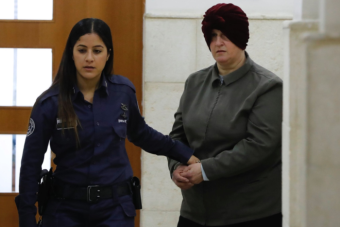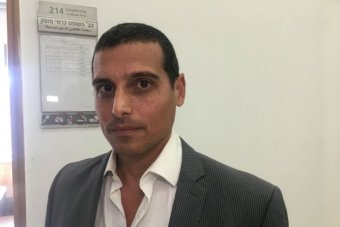Malka Leifer extradition case delayed again at latest hearing in Jerusalem
ABC
Norman Hermant and Fouad Abu Ghosh
17 May 2018
 Malka Leifer's legal team argued they had not seen enough of the prosecution's evidence.
ABC News: Sophie McNeill, file
Malka Leifer's legal team argued they had not seen enough of the prosecution's evidence.
ABC News: Sophie McNeill, file
There has been another delay in the extradition case of accused Australian-Israeli Sex offender Malka Leifer.
At the latest hearing in Jerusalem, Ms Leifer was transported from Nave Tirtsa women's prison to the District Court building.
But her lawyer convinced the judge she should remain in cells below and not appear in the court room.
After winning a two-week delay on May 2, Ms Leifer's lawyer, Yehuda Fried, was successful in seeking another extension.
Ms Leifer's legal team argued they still had not seen enough of the prosecution's evidence.
"I think this is just another way to make the procedure longer," state prosecutor Matan Akiva said.
The case will resume on May 31, when the judge will rule whether enough of the evidence against Ms Leifer has been handed over.
At the latest hearing in Jerusalem, Ms Leifer was transported from Nave Tirtsa women's prison to the District Court building.
But her lawyer convinced the judge she should remain in cells below and not appear in the court room.
After winning a two-week delay on May 2, Ms Leifer's lawyer, Yehuda Fried, was successful in seeking another extension.
Ms Leifer's legal team argued they still had not seen enough of the prosecution's evidence.
"I think this is just another way to make the procedure longer," state prosecutor Matan Akiva said.
The case will resume on May 31, when the judge will rule whether enough of the evidence against Ms Leifer has been handed over.
 Manny Waks says the delay is difficult for Ms Leifer's alleged victims. (ABC News: Fouad Abu Ghosh)
Manny Waks says the delay is difficult for Ms Leifer's alleged victims. (ABC News: Fouad Abu Ghosh)
Mr Akiva said Ms Leifer's lawyer was attempting to dramatically expand the evidence to be considered in the proceedings.
That included calling witnesses who were involved in the investigation of Ms Leifer, who for years maintained she was mentally unwell and could not stand the stress of an extradition hearing.
In February she was finally arrested after an undercover Israeli police investigation found she was fit to stand trial.
"The District Attorney believes the only people who should be heard in court is the psychiatrist," Mr Akiva said.
He said if Ms Leifer's lawyer Yehuda Fried was successful, it would mean even more delays.
"He wants everyone involved in the investigation (to appear)."
Mr Fried also argued that his client was being treated with psychiatric drugs in prison.
He told the judge that was an indication that she was mentally unwell and not capable of appearing for an extradition hearing.
The judge ordered another psychiatric assessment of Ms Leifer. The results will be also be reported to the court on May 31.
Australian-Israeli victims' rights advocate Manny Waks said the results were disappointing.
"It is disappointing, especially for her alleged victims who are sitting with bated breath in Australia, waiting for news," he said.
"Yet again we are seeing these stalling tactics."
Despite some Israeli legal experts predicting the high-profile nature of this case might mean an expedited process, Mr Akiva had another view Wednesday.
"Even a regular extradition takes around a year," he said, adding it was far from a regular case.
Originally published at ABC.
That included calling witnesses who were involved in the investigation of Ms Leifer, who for years maintained she was mentally unwell and could not stand the stress of an extradition hearing.
In February she was finally arrested after an undercover Israeli police investigation found she was fit to stand trial.
"The District Attorney believes the only people who should be heard in court is the psychiatrist," Mr Akiva said.
He said if Ms Leifer's lawyer Yehuda Fried was successful, it would mean even more delays.
"He wants everyone involved in the investigation (to appear)."
Mr Fried also argued that his client was being treated with psychiatric drugs in prison.
He told the judge that was an indication that she was mentally unwell and not capable of appearing for an extradition hearing.
The judge ordered another psychiatric assessment of Ms Leifer. The results will be also be reported to the court on May 31.
Australian-Israeli victims' rights advocate Manny Waks said the results were disappointing.
"It is disappointing, especially for her alleged victims who are sitting with bated breath in Australia, waiting for news," he said.
"Yet again we are seeing these stalling tactics."
Despite some Israeli legal experts predicting the high-profile nature of this case might mean an expedited process, Mr Akiva had another view Wednesday.
"Even a regular extradition takes around a year," he said, adding it was far from a regular case.
Originally published at ABC.